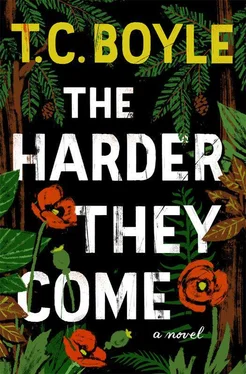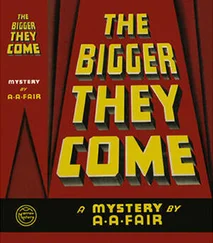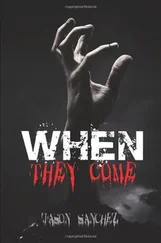She was just finishing up when her cell rang. It was Christabel.
“Just checking in,” Christabel said. “You all right?”
“I’m not hungover, if that’s what you mean. I wasn’t even buzzed last night. Not when they pulled me over. I mean, we did eat, didn’t we?”
“I feel so bad.”
“Bad? Why should you feel bad? The one that ought to feel bad is me. And the System. The System ought to feel bad, so bad it just rots from the inside out.”
“What I mean is, I should have been driving. I should never have let you, I mean, with what happened with the police last time around—”
She could hear Christabel breathing on the other end of the line, a series of deep, wet, patient breaths that were like a sedative. She could feel herself calming down. Christabel. Her best friend. Where would she be without her? “Don’t worry about me,” she said.
“Well, I am worried.”
“They can’t touch me.”
“What are you talking about, Sara — they’ve locked you up twice in the last, what, two months now?”
“What I’m talking about is I’m not going to be around, I’m out of here — I’ve had it, Christa, I really have—”
“Please don’t tell me you’re going to be like this again. If you skip out on this—”
“Don’t worry, I’ve got the money, I’m not going to burn you.”
“If you skip out they’re going to put you in jail, don’t you realize that? Don’t you get it? And not just for an hour or overnight either.”
She began to realize that on top of everything else the conversation was making her extremely unhappy, this conversation, even if it was with her best friend, even if Christabel only wanted to make her feel better, but she wasn’t making her feel better and maybe that was why she couldn’t help snapping at her. “So what are you now, a legal expert?”
“Oh, come off it, Sara — it’s just common sense.”
“Sure, and what do you know? You’re just a slave like all the rest of them. If you’d just read your Fourteenth Amendment, just read it—”
“ Sara —”
And then she was quoting, from memory, because she was rankled and riled and she had to do something, “‘No state shall make or enforce any law which shall abridge the privileges or immunities of citizens of the United States; nor shall any State deprive any person of life, liberty, or property, without due process of law; nor deny to any person within its jurisdiction the equal protection of the laws.’ You want me to go on?”
Nothing.
“Because I will. Because that right there is the essence of it, when the states gave up their rights and made all freemen on the land into federal citizens and then along comes the Social Security Act, surprise, to establish accounts in debit on every one of us, not to mention Roosevelt taking us off the gold standard—”
“Sara! Sara, listen, will you?” And here was Christa shouting at her, actually shouting at her because she didn’t want to hear the truth and never had. “Sara, I haven’t got time for this. I’m sorry. I got to go.”
“Yeah,” she said, and if her voice was bitter right down to the dregs, so what? “I got to go too.”
SHE WAS AT THE stove two days later, making a pot of low-cal chicken vegetable soup (tenders sautéed in safflower oil with garlic and onions, chicken stock, zucchini, tomatoes and snow peas from her garden), late afternoon, a glass of zinfandel on the counter beside her, everything as still as still can be. Kutya was asleep on the floor, in the cool place by the sink. A faint breeze, just the breath of one, came in through the screen windows. Quartering the tomatoes and dicing the zucchini, occasionally taking a sip of wine and gazing idly out the window to where the hummingbirds were buzzing each other off the feeder, she felt herself easing into a kind of waking dream, and wasn’t this the way life was supposed to be? No worries. Just living in the moment. Normally she would have been listening to the radio, but she’d spun through the dial twice and there was nothing but crap on — classical, with the stick-up-the-ass announcers who sounded as if they’d had all their blood drained out of them the minute they turned the microphone on; Mexican talk; Mexican music; Mexican car ads; classic rock with the same playlist they’d been rehashing for the last half century and, if you didn’t like that, the alt rock that was such crap even the musicians’ mothers couldn’t take it — and so she was listening to the house breathing around her, to the jay outside the window and the neat controlled tap and release of the blade on the cutting board.
She hadn’t heard from Christabel since the night before last, since their fight, if you could call it that, but what best friends didn’t fight once in a while? You weren’t really close with somebody unless you could let it all hang out — that was what intimacy was all about, going deep, getting under each other’s skin, taking the good with the bad. That was what she was thinking, elevating the edge of the cutting board now to guide the zucchini and tomatoes into the pot and wondering if she had any mushrooms left in the refrigerator because mushrooms would give the soup a little more density and add a nice subtle flavor — the creminis, the chewy ones — when the strangest feeling came over her, almost as if a ghost had materialized in the room behind her, and that was even stranger, because she didn’t believe in ghosts. She believed in graves, six feet down, and the spirit trapped in the body. That rotted.
Still, she couldn’t help turning her head to look over her shoulder as the steam from the pot rose around her and the garlic sent up its aroma to sweeten the room, but there was nothing there. The strangest thing — she’d have to tell Christabel about it. To the refrigerator — yes, there were the creminis — and then to the sink to rinse them and again to the cutting board. Then the feeling came back, stronger now, and she turned around again and there he was, Adam, standing in the doorway, arms akimbo, trying to smile. “Adam,” she said, naming him, just that, but she was soaring inside.
He was in his fatigues, the knife strapped at his side, his boots scuffed, his face and scalp tanned as deeply as any lifeguard’s. Behind him, in the hallway that led to the living room, she could see the dark mound of his discarded pack and the thin shadow of the rifle leaning up against the wall. The dog, too lazy and spoiled to do his job properly, lifted his head suddenly, gave a soft woof and trotted over to him. Adam hadn’t moved or said a word, but now he reached behind him, ignoring Kutya, who was wagging his tail in recognition and sniffing at his pantleg, and produced a plastic Ziploc bag that seemed to contain a dark smear of something that might have been chocolate but wasn’t. “I got the shits,” he announced.
She was going to ask if he was hungry, if he wanted a glass of wine, if he’d been out there camping in the woods all this time (the answer to that was obvious, just from a glance at him), but instead she said, “You need Pepto-Bismol? I’ve got those little pink tabs, I think, and maybe a bottle too.” She looked at him dubiously. His pants were stained. He’d lost weight. She could smell him from all the way across the room.
He didn’t answer, just repeated himself: “I got the shits.”
“Or maybe something stronger? Imodium? I think I might have some in the medicine cabinet. .” And she started for the bathroom but he just reached out and grabbed hold of her in his arms that were like steel cables and pressed her to him, hard, so hard it was as if he never wanted to let go, and then he was kissing her, the plastic bag flapping behind her so that she could feel the inflexible zippered edge of it digging into her where her pants pulled away from her blouse, and she held on to him just as tightly and kissed him back with everything she had.
Читать дальше












